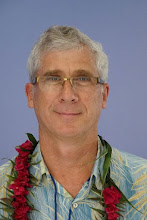Ever heard of the psychological term "synchronicity"? It's a term (usually heard from the lips of the followers of Carl Jung) which is their way of saying "everything happens for a reason". Something like this happened to me last week when I was flying from Newark NJ to Washington D.C. I was reading The Mountain Behind the Mountain (1993) a book on Celtic Spirituality by my old professor at the University of Edinburgh, Fr. Noel O'Donoghue. Along the way, I heard the person behind me speaking about the history of Ireland. When we were deplaneing, I turned to this individual, and said, "I heard you speaking about Ireland, and wanted to know if you've ever read this book?" and handed him Fr. Noel's book. He replied, "read it, I knew Fr. Noel!". And then he said, "Hello, my name is David Stang".
David and I met a week later in a local Irish bar (hence the dark photo), where we sipped some Guinness, eat fish and chips, laughed, spoke about Celtic Spirituality and history, and people we knew in common. As it turns out, David is a scholar on the Celtic tradition, and has also written a book on Celtic Spirituality, Emerald Spirit (2003) which is subtitled as "A Journey into the Irish Heart and Soul", and is published in Ireland. I'll also write a review of that book later upon returning to Hawaii. David also generously shared with me some essays he had written on the history of the Irish and St. Patrick. I later read these with great interest and was particularly impressed with both the scholarship and ability of David to tell a good story, just what you would expect for a good Celt. David "knows" Ireland, has a home in Kerry, and proudly states he has lived there "sixteen years in all".
I share this story, because I too believe that everything in life, good and bad, serve some kind of divine purpose. Everything does happen for a purpose. It's fascinating to note, that in speaking with David, he shared with me some recent "Celtic miracles" in his life, and I enjoyed hearing these. And at the same time as David was speaking, I realiaaed that I too was experiencing my own "Celtic miracle" in meeting David, having friends in common, and later, having the opportunity to speak with him further, and in developing a new friendship. Yet this phenomena is not something that should be strange to us in the Celtic tradition. The notion of welcoming the stranger, is central to Celtic Spirituality. I thought back to the lives of the many Celtic saints who practiced "welcoming" and thought of St. Cuthbert and remembered how he welcomed strangers, and in so doing, entertained angels unaware. These saints of old were onto something. I am a better person for going out of my way (and getting out of self) to say "hello" to a "stranger". I have also met someone who can teach me something more about a tradition I love.
This is the way our God works-through people, and through relationships, even when we least expect it. If we have the eyes to "see" this way, each moment, each event can open up rich and new possibilities. Change never comes easy, and I have to confess that I am one of those types who always looked for the big splash or Damascus Road experience. But that's both bad theology and not realistic! We should know from the Carmina Gadelica, that great collection of traditional Celtic prayers and blessings, that miracles surround us each day; in the rising and setting of the sun, in our daily chores, the breathe we take, the simple act of eating food, and the presence of others around us. Fr. Noel was right and used to say with a twinkle in his eyes, "miracles are everywhere"!
Thursday, November 12, 2009
Subscribe to:
Post Comments (Atom)




This is an interesting blog. I am a Catholic Benedictine oblate which leads to an interest in Celtic monasticism. I am by no means an expert, my impressions, no doubt, have been created with only a partial palette of Celtic monasticism’s long history. That being said, one of the most fascinating characteristics of Celtic monasticism is how such an Eastern form of Christian monasticism from the far-away east should find itself transplanted to the most western and remote part of western world — and there would flourish and contribute to the body of Christ in a way (I believe) that has never been duplicated.
ReplyDeleteAnd I am equally puzzled by a good historian’s remark (so I assume he would have known the best research and theories) that “we think Eastern monasticism was introduced to the Celts by commerce.” Huh? That comment raised more questions than it answered.
Great blog witnessing to the monasticism’s unique spiritual power in the life of the global Church.